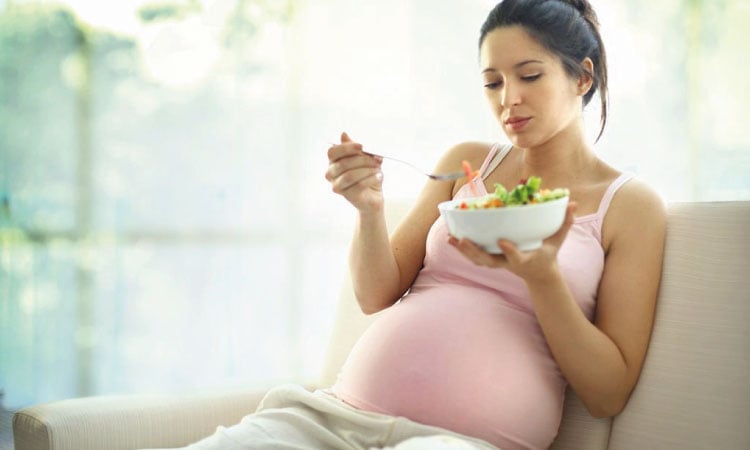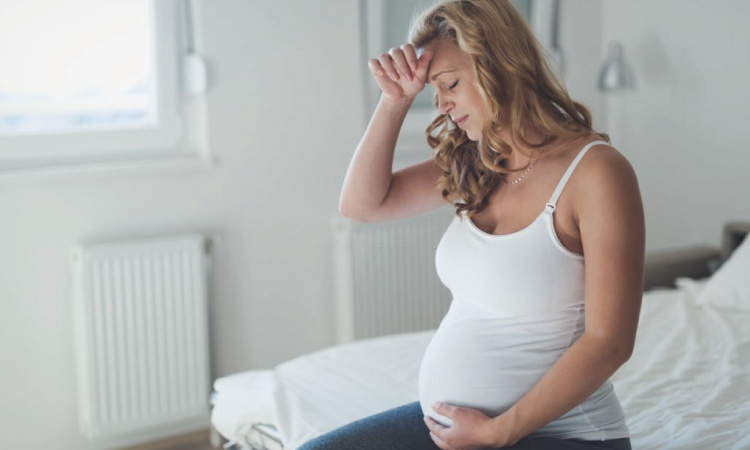Pregnant women often experience fatigue or even exhaustion. Women often experience fatigue as one of their first symptoms of pregnancy. The extent and type of exhaustion that women experience throughout their pregnancy vary from woman to woman. Nonetheless, it is common to feel more tired than usual during pregnancy. Women typically feel fatigued during their first trimester of pregnancy. Fatigue during pregnancy usually subsides during the second trimester, only to return in the third trimester. Being tired won’t hurt the unborn baby, but it can make the pregnancy journey more challenging. Ninety-four percent of pregnant women experience fatigue during pregnancy1.
Pregnancy Fatigue – What Does It Feel Like?
Fatigue is an exhausting condition that is persistent and relapsing for no apparent reason. It is a feeling of weakness or tiredness that can be physical, mental, or a combination of the two. A pregnant woman with fatigue may wake up feeling as if she hasn’t slept the night before. Fatigue is one of the most common causes of sleep deprivation during pregnancy.
An exhausted pregnant woman may find it difficult to function properly at work or to be productive at home due to the feeling of being tired and drained. Fatigue during pregnancy is not the same as being drowsy, a condition that requires sleep. Sleeping well will not alleviate fatigue, unlike drowsiness.
What Causes Pregnancy Fatigue?
Numerous physical, emotional, and hormonal changes during pregnancy can lower your energy levels and cause fatigue. Factors that contribute to fatigue during pregnancy may differ depending on the stage of the pregnancy.
Common reasons for first-trimester fatigue
Our panel gynaecologist Dr Ankita Patel Tayal mentions a number of factors particularly in the first trimester that may cause pregnancy fatigue, including:
- Placenta development: During the first trimester of pregnancy, the placenta is created in the womb of the pregnant woman, which is crucial to the survival of the unborn baby. It is a large organ formed during pregnancy that provides the baby with the nutrients and oxygen it needs to grow and thrive. The process of making a placenta consumes an enormous amount of energy. This increases the odds of fatigue
- Pregnancy hormones: The increased production of progesterone during pregnancy contributes to pregnancy fatigue. If you have too much progesterone in your body, you can become sleepy. It is common for progesterone levels to fluctuate a great deal during pregnancy, which can affect energy levels
- Increased blood volume: The blood volume begins to increase during the first trimester of pregnancy. As the pregnancy advances, the blood volume reaches 50%. It is common for women to feel fatigued when they are creating blood and pumping it in order to ensure their unborn baby receives the nutrition and oxygen it needs
- Other factors that cause fatigue in the first trimester: Other factors that make women fatigued in the first trimester are increased metabolic rate, increasing heart rate changes in blood sugar and blood pressure levels, and demand for more nutrients
Common reasons for second-trimester fatigue during pregnancy
As you get closer to the end of your first trimester, you will begin to feel more like yourself again. Throughout the second trimester, which begins at week 13, many women exhibit a whole new level of energy. It’s a good time to take care of those important tasks before the baby arrives.
Related Reading: The Top 10 Precautions To Take In The Second Trimester Of Pregnancy
As energy levels decrease during the third trimester, which begins at week 28, many women take advantage of this time while pregnant to accomplish many responsibilities. If you are still experiencing fatigue during this trimester, however, don’t worry.
Calculate Due Date With LMP
The fatigue during pregnancy in the second trimester is likely to be less obvious but is still a possibility. However, if it appears to aggravate it should be intimated to the doctor. It could be a sign of an underlying health issue.
Common reasons for third-trimester fatigue during pregnancy

A relapse of pregnancy fatigue is likely to return with a vengeance during the third trimester. Third-trimester fatigue is due to:
- Extra weight gained
- Growing baby bump
- Trouble sleeping due to frequent urination, restless leg syndrome, heartburn, backache
- Stress is associated with having a baby
- Anxiety about the upcoming labor
- Multitasking. Trying to accomplish multiple responsibilities and planning a lot of things at this point in time will be quite tiresome
Related Reading: 8 Tips To Cope With Anxiety During Pregnancy Third Trimester
Is Pregnancy Fatigue A Sign Of A More Serious Problem That Needs To Be Addressed?
Although pregnancy fatigue is a perfectly normal symptom, if you are feeling overtired or have other concerns regarding your health, please do not hesitate to seek assistance from your healthcare provider. Dr Ankita Patel Tayal, obstetrician & gynaecologist, emphasises that it is necessary to rule out any underlying conditions that may be causing excessive and persistent fatigue during pregnancy. It is equally important to get all your routine blood tests as advised by your doctor to rule out any co-existing medical problems like anemia, thyroid disease or diabetes.
It is important to note that there are underlying health issues that could lead to pregnancy fatigue, which include:
- Infections (viral, bacterial, or fungal): Pregnancy can make you more prone to infections. Most infections, let it be urinary tract infections or even colds, can lead to fatigue
- Anemia: Anemia is more common in pregnant women since their blood volume expands dramatically and iron stores are depleted. Pregnancy anemia is characterized by feeling extremely weak along with paleness, breathlessness, and fainting spells
- Gestational diabetes: An expecting mother’s body becomes resistant to insulin when she suffers from gestational diabetes. Being unable to control blood sugar levels makes her feel extremely fatigued. It can be difficult, however, to distinguish GD fatigue from pregnancy fatigue. Additionally, if you experience excessive thirst or frequent urination, this may be a sign of gestational diabetes. It is equally important to attend your prenatal appointments and perform the screening tests including the glucose screening test at 24-28 weeks
- Hypothyroidism or hyperthyroidism: Low or high levels of thyroid hormone, which can appear for the first-time during pregnancy, can trigger pregnancy fatigue. When thyroid disorders are the cause of fatigue, pregnant women may also experience other symptoms of thyroid disorders during pregnancy, like excessive weight gain, increased sensitivity to cold, excessive mood swings, etc
Tips For Coping With Fatigue During Pregnancy
Even though it may be difficult to muster up the energy to do anything, there are a few things you can do to reduce the effects of fatigue during pregnancy.
Here are a few tips to deal with fatigue:
1. Rest and sleep should be prioritized
When you are pregnant, your body is basically working overtime. Getting sufficient rest and not overworking yourself is of the highest importance. Pay attention to the signs of fatigue your body shows.
Try to sneak in a nap whenever possible. Try to go to bed earlier. You need to take it easy and spend more time doing what you find relaxing. You can also cut down on fluids for a few hours before bedtime in order to minimize your midnight trips to the bathroom.
2. Re-adjust schedule
It goes without saying that your busy pre-pregnancy schedule will probably be too much for you. If your usual day-to-day activities are too draining during this time, try to adjust your schedule to be less full. Try to avoid the household chores during pregnancy that make you feel exhausted. You may be surprised at how much of a difference it can make!
3. Unfollow unhealthy food choices and eat a balanced diet

Your meals can make all the difference between a healthy pregnancy and a complicated one. Each item on your menu should be safe and nutritious. Eating food that is energizing and rich in nutrients can help you deal with fatigue.
Make sure your daily menu contains food that will give you all necessary nutrients like iron, protein, and complex carbs, as well as a sufficient number of calories. Meals that provide long-lasting energy, such as whole grain, dairy, etc. are better than foods that give you a short burst of energy, like sugar.
Also bear in mind that it is important to be hydrated at all times. Dehydration during pregnancy can have dangerous side effects.
4. Engage in moderate physical activity
This may seem counter-productive, but in truth, a moderate amount of exercise can leave you feeling more energized! Around 20 to 30 minutes of walking during pregnancy or stretching can give you the energy you need to make it through the day. However, work with your healthcare provider and ensure they are okay with it.
Related Reading: 8 Benefits Of Exercising During Pregnancy
5. Complementary therapies may be beneficial
If nothing seems to work and your fatigue really starts to affect your quality of life, it is time to consider complementary therapies. This includes activities like acupuncture and aromatherapy, which can help you relax and leave you feeling energized. Make sure you consult your healthcare provider before you opt for this, and also ensure the practitioner is qualified to treat pregnant women.
Acupuncture can reduce stress and tension, and can also help reduce pain. It stimulates the release of endorphins in your brain, which can make you less tired. It can also reduce other common pregnancy symptoms like nausea, headaches, and backaches.
As for aromatherapy, you can see a qualified therapist for aromatherapy massage. A massage before bed can help you sleep much better and reduce your fatigue. You can also occasionally have a relaxing bath with around three drops of essential oils.
6. Get your load streamlined
As mentioned above, clearing up your schedule can make a world of difference. So don’t feel bad about cutting out a few social commitments. Let yourself take it easy for a few months. Try to reduce your work hours. Don’t be afraid to take a day or two off.
7. Get help- don’t hesitate to ask
There is no shame in asking for help. It is important to have a strong support system when you are pregnant. If you have other children, ask your family members or trusted friends to watch them every now and then. School or daycare can also be helpful to you during this time.
8. Stay hydrated
As mentioned above, it is very important to stay well hydrated during pregnancy. Drink plenty of water during the day. You can cut down on it a few hours before bedtime in order to reduce urination during the night. Beverages like tea and coffee can also help you stay hydrated, but make sure you drink them in moderation as they can cause more fatigue in the long term.
Conclusion

Pregnancy can be one of the most draining experiences you go through. There is a seemingly never-ending list of concerns. Adding that to the many changes your body goes through, it is no surprise that you feel fatigued. In fact, fatigue is one of the most common pregnancy symptoms out there, and it is completely normal.
However, bear in mind that, if the fatigue becomes too much to handle, there are a few ways you can reduce it. It is important to pay attention to your body’s needs and provide it with all the necessary nutrients. Also keep in touch with your healthcare provider in order to ensure you are having a safe, normal, healthy pregnancy.
Just hang in there! A few more months, and you won’t have to worry about such pregnancy side effects.
FAQs
Generally, pregnancy fatigue is completely normal and it won’t harm you or your baby. You should consult your practitioner if you experience severe and persistent fatigue at any point during your pregnancy.
In some cases, severe pregnancy fatigue may indicate a more serious condition that needs treatment.
During pregnancy, women tend to feel more fatigued than usual. It is only the intensity that varies. The first trimester is usually the time when women are most fatigued.
Generally, it disappears during the second trimester but usually returns during the third trimester. When it comes to fatigue, we have to consider it all the way through pregnancy.
The consumption of energy drinks during pregnancy is not recommended due to their high caffeine content. These drinks are also loaded with ingredients that should not be consumed by pregnant women.
It is not recommended to consume sports drinks during pregnancy. The sugar and other additives they contain make them unsuitable for pregnant women.

